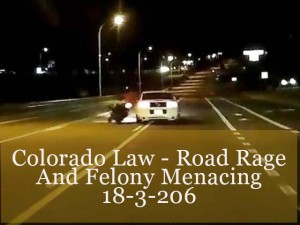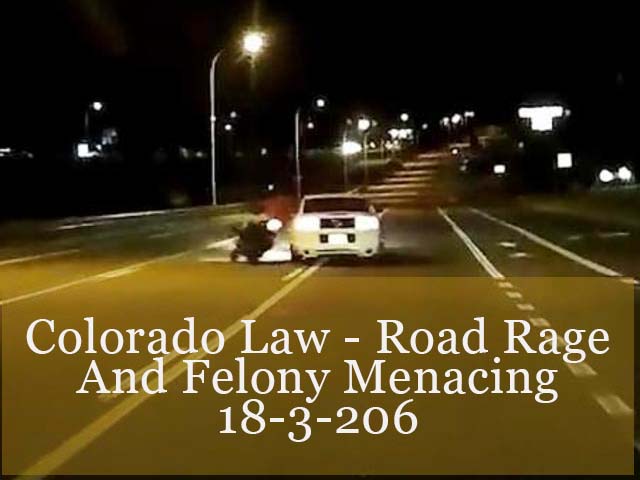






Colorado Law – Road Rage And Felony Menacing 18-3-206
By H. Michael Steinberg – Colorado Felony Menacing Criminal Defense Lawyer – Attorney
 Colorado Law – Road Rage And Felony Menacing 18-3-206 – The potential for being charged with the crime of felony menacing in Colorado in a so called road rage incident – is great. Colorado is an “open carry” state and it is common for the people of Colorado to have weapons in their automobiles. Road rage makes it more likely – in one of these incidents – one or even both parties may use their weapons.
Colorado Law – Road Rage And Felony Menacing 18-3-206 – The potential for being charged with the crime of felony menacing in Colorado in a so called road rage incident – is great. Colorado is an “open carry” state and it is common for the people of Colorado to have weapons in their automobiles. Road rage makes it more likely – in one of these incidents – one or even both parties may use their weapons.
While I have written on this subject before in other contexts such as menacing in Colorado domestic violence cases, this article takes a closer look at the legal issues surrounding felony menacing on the road.
All Crimes Are Broken Down Into Their Constituent Elements
What separates Felony Menacing in Colorado from Misdemeanor Menacing is understanding those elements.
The Law of Felony Menacing In Colorado C.R.S. (Colorado Revised Statutes) Section18-3-206:
(1) A person commits the crime of menacing if, by any threat or physical action, he or she knowingly places or attempts to place another person in fear of imminent serious bodily injury.
(a) By the use of a deadly weapon or any article used or fashioned in a manner to cause a person to reasonably believe that the article is a deadly weapon; or
(b) By the person representing verbally or otherwise that he or she is armed with a deadly weapon.
Serious bodily injury is defined in another law – 18-1-901(3)(p). Serious Bodily Injury means bodily injury which, either at the time of the actual injury or at a later time, involves a substantial risk of death, a substantial risk of serious permanent disfigurement, a substantial risk of protracted loss or impairment of the function of any part or organ of the body, or breaks, fractures, or burns of the second or third degree.
Menacing is a class 3 misdemeanor, but, it is a class 5 felony if committed:
Colorado Felony Menacing – The Constituent Elements:
The Elements of Colorado Felony Menacing are:
1. That the defendant,
2. in the State of Colorado, at or about the date and place charged,
3. by threat or physical action,
4. knowingly placed or attempted to place another person in fear of imminent serious bodily injury,
5. [by the use of a deadly weapon, or any article used or fashioned in a manner to cause a person to reasonably believe that article is a deadly weapon.] -or-
[by representing verbally or otherwise that he or she is armed with a deadly weapon.]
Colorado Criminal Defense Lawyers Defend These Cases By Scrutinizing The Evidence – Asking Hard Questions
When an experienced Colorado criminal defense lawyer begins analyzing a case – he or she starts with the elements of the charge and begins to ask important questions:
First: Was a deadly weapon used?
For purposes of Colorado’s Felony Menacing Law a deadly weapon is a weapon that is capable of causing serious bodily injury. Colorado District Attorneys can be extraordinarily creative in alleging the use of a deadly weapon – hands, pens, chairs, an the like.
Traditional deadly weapons consist of guns, knives, bats, tools, etc.
Second: If a deadly weapon was not found – was there a “reasonable” representation (a communication) that the Defendant was armed with a deadly weapon that is unseen?
Third: Did the Defendant “knowingly” place, or attempt to place someone in fear of imminent serious bodily injury?
Here there are two key issues – (1) Did the Defendant actually KNOW they had placed another in fear of serious bodily injury AND if it is proven they did have that knowledge, was that effort or attempt an imminent threat – meaning it was a clear and present threat in the moment?
Sidebar Issue: Clients often say – well I may have threatened him (the alleged victim) but I never intended to cause fear in him and he actually wasn’t placed in fear of imminent serious bodily injury.. The law does not care. If a reasonable person would have been placed in fear of imminent serious bodily injury – not the actual fear of this specific alleged victim – the crime has been committed as to this element.
Fourth: Were the alleged statements ACTUALLY THREATS?
A threat is defined as a statement of purpose or intent to cause injury or harm to the person, property, or rights of another, by the commission of an unlawful act.
Colorado law makes no distinction between a conditional and unconditional threat. Even a threat that has a contingency – such as IF you approach me – I will shoot you – as long as the contingency itself remains in control of the person making the threat, it is sufficient under Colorado law.
A statement of purpose or intent to shoot another person conditioned on the other person making some move against the maker of the threat satisfies the “threat” element of the statutory definition of felony menacing in section 18-3-206.
The fact that the threat is conditioned upon a contingency in the control of the maker does not render the threat any less real to the person to whom it is directed
Fifth: Was the act that actually constituted the crime – performed as an act of self defense?
The Classic Road Rage Scenario – The Defendant Does Not Need To Actually POINT A Deadly Weapon At The Alleged Victim
Felony menacing in Colorado does not necessarily require that the “use” of the deadly weapon include the pointing of the weapon directly at the victim. The element of “use” is satisfied when the weapon is displayed in manner that causes victim to believe that it will be used against him in case of resistance.
In the case of an alleged road rage incident, the Defendant’s acts of opening a bag and displaying a handgun or showing a weapon to another while pointing it up in the air, or – if during the incident, placing or keeping a hand on gun, constituted “use” of deadly weapon – all meet the laws requirements.
If there is a road rage altercation and during that altercation the Defendant, while making the threat, uses a firearm in the presence of the alleged victim in a manner that would cause that fear for that victim’s safety – the Defendant most likely would be charged with knowingly placing or attempted to place that victim in fear of imminent serious bodily injury by means of a deadly weapon.
When You Are Alleged To Have Menaced A Police Officer – 18-3-202
Under Colorado Law – a person who commits the crime of felony menacing where the intended victim is a police officer or firefighter – has committed a very serious felony with a minimum mandatory sentence to prison of ten years.
Here is the law:
Menacing Against A Police Officer Or Firefighter – Assault in the First Degree – 18-3-202
A person commits Assault in the First Degree if:
….with intent to cause serious bodily injury to a peace officer, firefighter, judicial officer, or detention facility employee, he or she uses a deadly weapon to threaten the individual (who is engaged in the performance of his or her duties), and the offender knows or reasonably should know that the victim is a peace officer, firefighter, judicial officer, or detention facility employee.
Colorado Law – Road Rage And Felony Menacing 18-3-206
If you found any of the information I have provided on this web page article helpful please click my Plus+1 or the Share buttons for Twitter and Facebook below so that others may also find it.
The reader is admonished that Colorado criminal law, like criminal law in every state and at the Federal level, changes constantly. The article appearing above was accurate at the time it was drafted but it cannot account for changes occurring after it was uploaded.
If, after reading this article, you have questions about your case and would like to consider retaining our law firm, we invite you to contact us at the Steinberg Colorado Criminal Defense Law Firm – 303-627-7777.
Never stop fighting – never stop believing in yourself and your right to due process of law. You will not be alone in court, H. Michael at your side every step of the way – advocating for justice and the best possible result in your case.
 ABOUT THE AUTHOR: H. Michael Steinberg – Email The Author at [email protected] – A Denver Colorado Criminal Defense Lawyer – or call his office at 303-627-7777 during business hours – or call his cell if you cannot wait and need his immediate assistance – 720-220-2277. Attorney H. Michael Steinberg is passionate about criminal defense. His extensive knowledge and experience of Colorado Criminal Law gives him the edge you need to properly handle your case.
ABOUT THE AUTHOR: H. Michael Steinberg – Email The Author at [email protected] – A Denver Colorado Criminal Defense Lawyer – or call his office at 303-627-7777 during business hours – or call his cell if you cannot wait and need his immediate assistance – 720-220-2277. Attorney H. Michael Steinberg is passionate about criminal defense. His extensive knowledge and experience of Colorado Criminal Law gives him the edge you need to properly handle your case.
“A good criminal defense lawyer is someone who devotes themselves to their client’s case from beginning to end, always realizing that this case is the most important thing in that client’s life.”
You should be careful to make a responsible choice in selecting a Colorado Criminal Defense Lawyer – and we encourage you to “vet” our firm. Over the last 40 plus years – by focusing ONLY on Colorado criminal law – H. Michael has had the necessary time to commit to the task of constantly updating himself on nearly every area of criminal law, to include Colorado criminal law and procedure and trial and courtroom practice. H. Michael works hard to get his clients the best possible results in and out of the courtroom. He has written, and continues to write, extensively on Colorado criminal law and he hopes this article helps you in some small way – Colorado Law – Road Rage And Felony Menacing 18-3-206.

Other Articles of Interest:
- Road Rage And Aggressive Driving Crimes In Colorado – What Is It? How Is It Charged?
- Colorado State Felony – Menacing (18-3-206)
- Colorado State Felonies
- The Most Common Colorado Domestic Violence Crimes
- Important Colorado Traffic Violations and The Points If Convicted






















